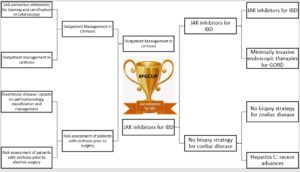We have just come to the end of our annual (friendly) competition, the #FGCup. We are very lucky to have had eight fantastic papers be included in a tournament and we thank our editor-in chief, Professor Mark Beattie, in helping to choose these. We also thank all our authors and reviewers for which this would not be possible without!
The summary of #FGCup is shown below and here we will outline the papers that were involved and reveal the ultimate winner.
Colonoscopy training has developed over the year with varying standards in training. The consensus statements developed by Siau et al1 really hone down on what is important in colonoscopy and how we can train to the same high standard to ensure a workforce fit for the future.
Mansour et al’s excellent three-part guidance on how we can manage patients with cirrhosis in the outpatient setting is next up. Part 12 covers those with compensated cirrhosis, Part 23 discusses decompensated cirrhosis and Part 34 is all about those special circumstances such as fertility and managing bleeding risk for invasive procedures. Complete with simple to follow proformas in the clinic setting, it really is the essential handbook to have in clinic.
Diverticular disease is extremely common in both the surgical and medical setting and this fantastic paper from Williams et al5 summarises the pathophysiology and management of these patients. Non-operative management is the mainstay for non-compliance diverticulitis and one wonders if we will see this in a medical take near you. Watch this space!
How do you know how to optimise patients with cirrhosis prior to non-hepatic surgery? What is VOCAL-Penn? How does this relate to the MELD and Child-Pugh-Turcotte score? All these questions and dilemmas are answered in the excellent guidance document paper by Abbas et al6.
JAK inhibitors are the up-and-coming star in inflammatory bowel disease. But how do you start someone on them? When should you start? How do they even work? Is it risky? A brilliant and easy-to-follow summary of the use of JAK inhibitors by Honap et al7 covering this and more!
All healthcare professionals within gastroenterology will be used to seeing GORD. You prescribe the PPI but they continue to get oesophagitis? Anti-reflux surgery is the natural next step. However, these can come with undesirable side effects and complications and endoscopic therapies are now emerging. Aslam et al8 outline these in this excellent paper.
The diagnosis of coeliac disease continues to develop. Hoyle at al9 demonstrate that using an anti-TTG level of >10 times the upper limit of normal can be diagnostic in children. In fact, the British Society of Paediatric Gastroenterology, Hepatology and Nutrition have recently changed their guidance to use this as a guide for diagnosis. Although not yet part of guidance in adult gastroenterology, it may only be a matter of time…
Last but certainly not least, Rebecca Kane10 gives us the lowdown on what is new in hepatitis C, including who we should be testing and treating. Read all about it here!
These eight papers really gave us a good show in #FGCup, but ultimately, #teamIBD staved off all the competition and JAK inhibitors in IBD came up top! This competition demonstrates the quality of papers we receive over the year and we hope to see more over the coming year. See you next year for the #FGCup2024 and do consider submitting to the journal as you never know: your paper may be in the running!
References
- Siau K, Pelitari S et al. JAG consensus statements for training and certification in colonoscopy. Frontline Gastroenterology. 2023; 14(3): 201-221.
- Mansour D, Masson S et al. British Society of Gastroenterology Best Practice Guidance: outpatient management in cirrhosis – part 1: compensated cirrhosis. Frontline Gastroenterology. 2023; 14(6): 453-461.
- Mansour D, Masson S et al. British Society of Gastroenterology Best Practice Guidance: outpatient management in cirrhosis – part 2: decompensated cirrhosis. Frontline Gastroenterology. 2023; 14(6): 462-473.
- Mansour D, Masson S et al. British Society of Gastroenterology Best Practice Guidance: outpatient management in cirrhosis – part 3: special circumstances. Frontline Gastroenterology. 2023; 14(6): 474-482.
- Williams S, Bjarnason I et al. Diverticular disease: update on pathophysiology, classification and management. Frontline Gastroenterology. 2023; 15(1): 50-58.
- Abbas N, Fallowfield J et al. Guidance document: risk assessment of patients with cirrhosis prior to elective non-hepatic surgery. Frontline Gastroenterology. 2023; 14(5): 359-370.
- Honap S, Agorogianni A et al. JAK inhibitors for inflammatory bowel disease: recent advances. Frontline Gastroenterology. 2024; 15(1): 59-69.
- Aslam N, Telese A et al. Minimally invasive endoscopic therapies for gastro-oesophageal reflux disease. Frontline gastroenterology. 2023; 14(3): 249-257.
- Hoyle A, Gillett P et al. No-biopsy strategy for coeliac disease is applicable in adult patients: a “real-world” Scottish experience. Frontline Gastroenterology. 2023; 14(2): 97-102.
- O’ Kane R. Hepatitis C: recent advances and practical management. Frontline Gastroenterology. 2023; 14(5): 415-421.
